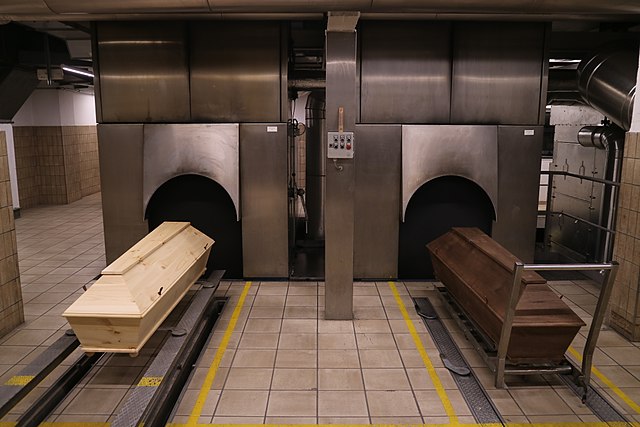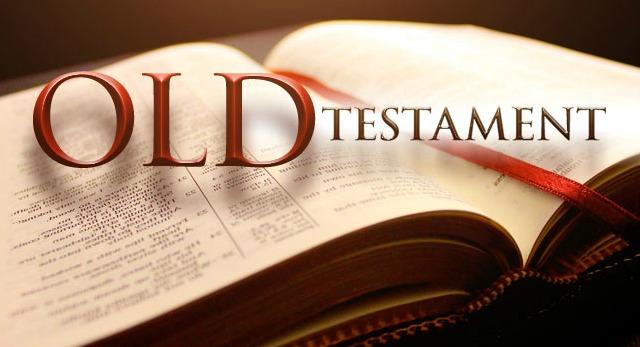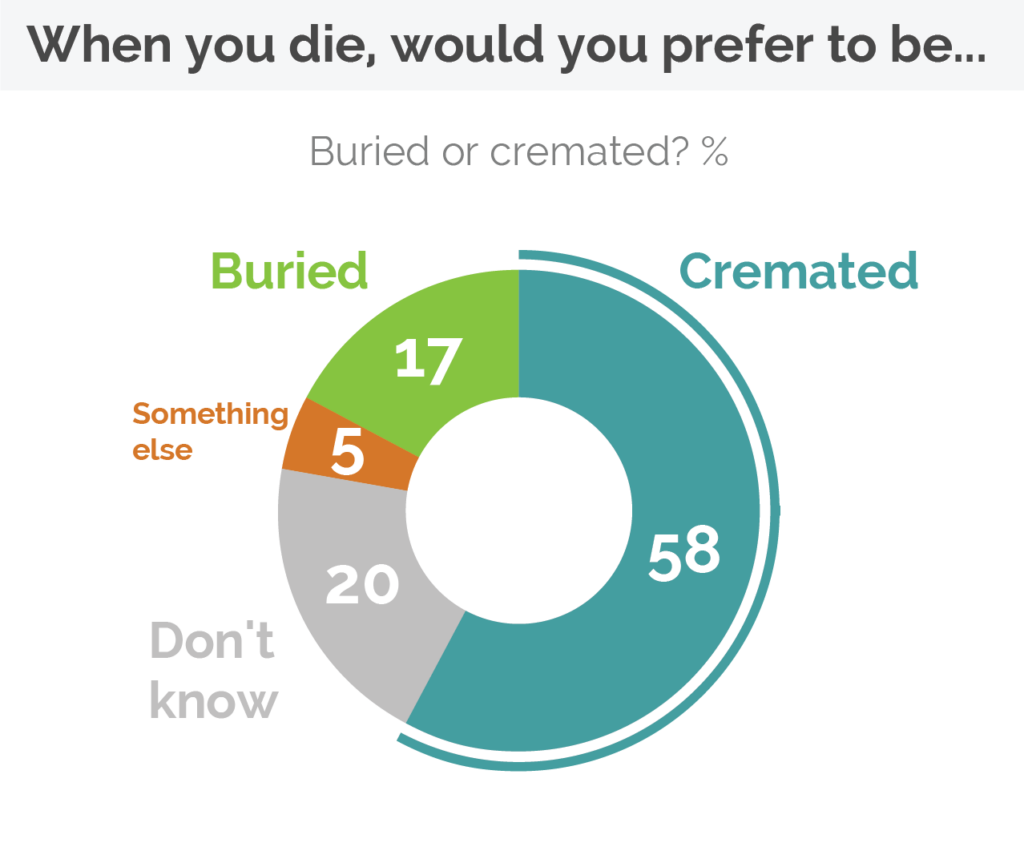What Does the Bible Say About Cremation?
Cremation has become an increasingly popular method of disposition for those who have passed away.
However, there are still some people who hold the belief that cremation is a sin or against the teachings of the Bible. So, what does the Bible say about cremation?
Cremation In The Bible
Another example is found in Amos 2:1, where God says, “For three sins of Moab, even for four, I will not relent. Because he burned as if to lime the bones of Edom’s king.” This passage refers to the practice of burning bones to turn them into lime, which was then used to make cement.
It is worth noting, however, that this passage is not referring to cremation as a method of disposition for the dead, but rather to a specific practice involving the burning of human bones.

Is Cremation A Sin?
There is no clear-cut answer to this question, as the Bible does not explicitly condemn or condone cremation.
The decision to be cremated or buried is ultimately a personal one and should be based on individual beliefs, preferences, and cultural traditions.
It is worth noting, however, that some religious traditions and denominations have specific beliefs and practices regarding cremation.
For example, the Catholic Church once prohibited the practice of cremation, but in 1963 lifted the ban and now permits it as long as it is not chosen for reasons that are contrary to Christian doctrine.
Common Questions About Being Cremated
What Does The Bible Say?
Many people have questions about cremation, such as whether or not it is allowed if it affects the resurrection of the body, and if it is a respectful way to dispose of the remains. While the Bible does not provide definitive answers to these questions, there are a few things to consider.
Firstly, it is important to remember that God is not limited by physical matter. He can resurrect the dead regardless of the condition of their bodies or remains. As 1 Corinthians 15:35-38 says, “But someone will ask, ‘How are the dead raised? With what kind of body do they come?’ You foolish person! What you sow does not come to life unless it dies. And what you sow is not the body that is to be, but a bare kernel, perhaps of wheat or of some other grain. But God gives it a body as he has chosen, and to each kind of seed its own body.”
Secondly, it is important to consider the cultural and historical context in which the Bible was written. During biblical times, burial was the most common method of disposition, and cremation was not widely practiced.
As a result, there are few references to cremation in the Bible, and it is difficult to draw definitive conclusions about its acceptability or morality.
Old Testament
In the Old Testament, burial was the most common method of disposition for the dead. Many Old Testament figures were buried in tombs or caves, including Abraham, Sarah, Isaac, Rebekah, Jacob, and Leah.
This burial practice has continued into the New Testament, with Jesus himself being buried in a tomb after his crucifixion.
However, there are a few examples of cremation in the Old Testament. As previously mentioned, the burning of King Saul’s body and those of his sons are recorded in 1 Samuel 31:11-13. Another example is found in 2 Chronicles 16:14, which describes the death of King Asa: “They buried him in the tomb that he had cut for himself in the city of David. They laid him on a bier that had been filled with various kinds of spices prepared by the perfumer’s art, and they made a very great fire in his honor.”
While these examples do not provide a clear indication of whether cremation is acceptable or not, they do show that the practice was known and used in certain circumstances during biblical times.

What Does The King James Version Of The Bible Say About Cremation?
The King James Version of the Bible does not use the word “cremation” specifically, but it does use the word “burn” in a variety of contexts. For example, in Genesis 38:24, says, “And it came to pass about three months after, that it was told Judah, saying, Tamar thy daughter in law hath played the harlot; and also, behold, she is with child by whoredom. And Judah said, Bring her forth, and let her be burnt.” This passage refers to the punishment of burning for a woman who had committed adultery.
Another example is found in Leviticus 20:14, which says, “And if a man take a wife and her mother, it is wickedness: they shall be burnt with fire, both he and they; that there be no wickedness among you.” This passage refers to the punishment of burning for those who commit incest.
It is worth noting, however, that these passages are not referring to the practice of cremation as a method of disposition for the dead, but rather to the punishment of burning for specific sins.
Why Are More People Choosing Cremation?
In recent years, there has been a significant increase in the number of people choosing cremation as a method of disposition for their remains. There are several reasons for this trend.
One reason is that cremation is often less expensive than traditional burial. The cost of a casket, burial plot, and other expenses associated with traditional burial can add up quickly, whereas cremation typically only involves the cost of the cremation itself and any additional funeral services, or memorials.
Another reason is that cremation is often seen as a more flexible and convenient option.
The cremated remains can be easily transported and stored, and there are a variety of options for disposition, such as scattering the ashes, burying them, or keeping them in an urn.
Finally, some people choose cremation because they believe it is a more environmentally friendly option.
Traditional burial can involve the use of embalming fluids, which can be harmful to the environment, whereas cremation does not require embalming and can be done without the use of harmful chemicals.

Why Does This Matter?
The question of whether or not cremation is acceptable or sinful according to the Bible is a matter of personal belief and interpretation.
However, it is important to remember that the decision to be cremated or buried should be made based on a variety of factors, including cultural traditions, personal beliefs, and practical considerations.
Ultimately, the Bible does not provide a clear answer to the question of cremation, and it is up to each individual to decide what they believe is the best option for themselves and their loved ones.
Whether one chooses to be cremated or buried, what matters most is how they lived their life and the impact they had on those around them. It is important to remember that the choice of cremation or burial is a personal decision that should be made with care and consideration.
It is also important to communicate your wishes to your loved ones so that they can honor your wishes and provide the appropriate final arrangements.
You may also wish to discuss your decision with a religious leader or spiritual advisor to ensure that it aligns with your beliefs and values.
Why Is Cremation Forbidden For Some Christians?
It is important to note that cremation is not universally forbidden in Christianity. Many Christian denominations, including the Catholic Church, permit cremation as a method of disposition for the dead. However, there are some Christians who hold the belief that cremation is forbidden or discouraged based on their interpretation of biblical teachings.
One reason why some Christians may believe that cremation is forbidden is the belief in the bodily resurrection of the dead. According to this belief, the body must be intact to be resurrected at the end of time.
Some Christians argue that cremation destroys the physical body and therefore interferes with the resurrection process.
Another reason why some Christians may view cremation as forbidden is based on the belief in the sacredness of the body. According to this belief, the body is a temple of the Holy Spirit and should be treated with respect and reverence. Some Christians argue that cremation is a disrespectful and irreverent way to dispose of the body.
However, it is important to note that these beliefs are not universally held among Christians and that there is no clear-cut answer to the question of whether or not cremation is forbidden in Christianity. Ultimately, the decision to be cremated or buried should be based on personal beliefs, cultural traditions normal burial practices, and practical considerations.
What Does God Say About Keeping Ashes?
There is no clear answer in the Bible about what God says specifically about keeping ashes. However, it is important to remember that the Bible teaches that the body is a temple of the Holy Spirit and should be treated with respect and reverence.
This teaching may be applied to the ashes of a loved one who has been cremated.
Some Christians believe that keeping the ashes of a loved one is a way to honor their memory and keep them close. However, it is important to remember that the ashes are still the remains of a human body and should be treated with respect and reverence.
It is also important to consider the intentions behind keeping the ashes. If the intention is to honor the memory of a loved one and keep them close, then keeping the ashes may be appropriate.
However, if the intention is to use the ashes in a disrespectful or irreverent manner, then keeping the ashes may not be appropriate.
Ultimately, the decision to keep the ashes of a loved one should be made with care and consideration.
It is important to discuss the decision with family members and loved ones to ensure that everyone is comfortable with the decision. Additionally, it is important to ensure that the ashes are kept safely and respectfully.
In conclusion, the question of what the Bible says about cremation is a complex and multifaceted one.
While there are a few examples of cremation in the Bible, there is no clear condemnation or approval of the practice.
